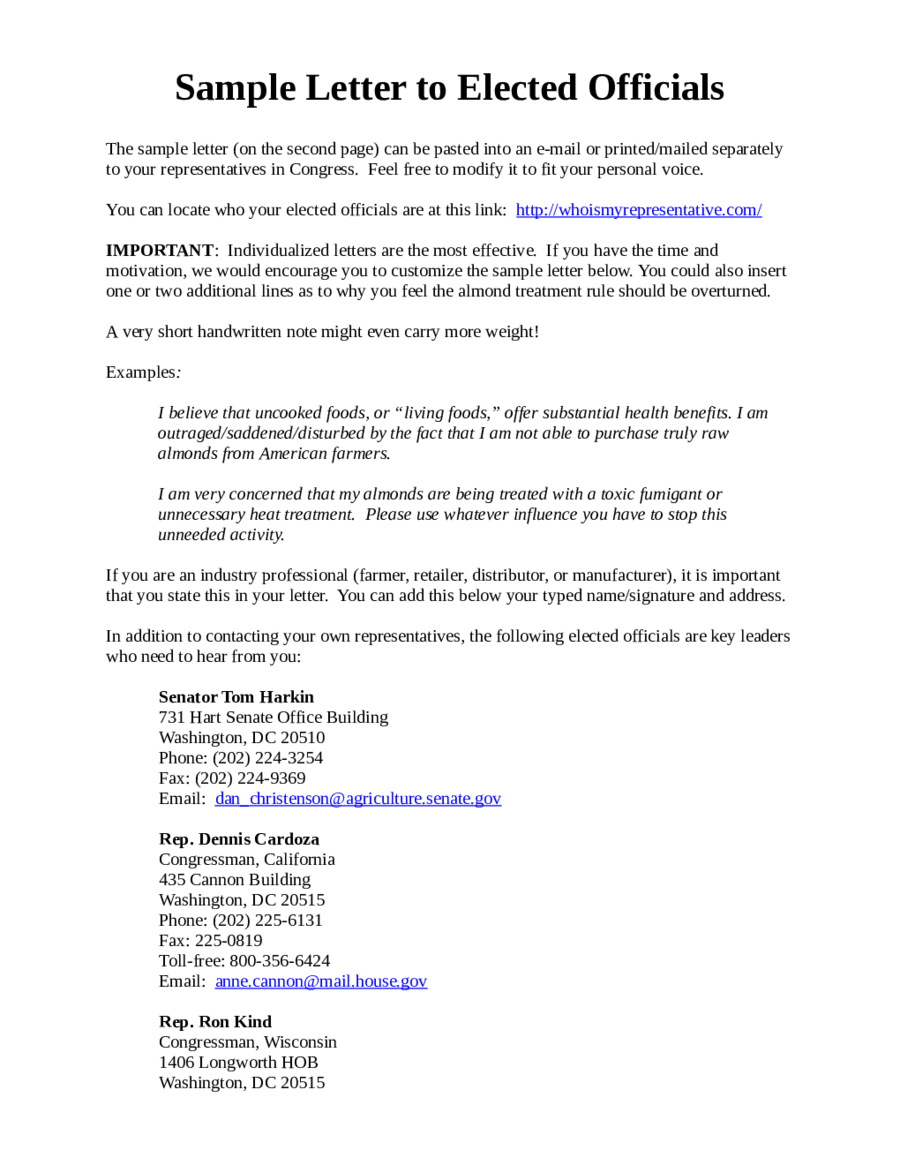Fillable Printable Sample Letter to Elected Officials
Fillable Printable Sample Letter to Elected Officials

Sample Letter to Elected Officials

Sample Letter to Elected Officials
The sample letter (on the second page) can be pasted into an e-mail or printed/mailed separately
to your representatives in Congress. Feel free to modify it to fit your personal voice.
You can locate who your elected officials are at this link: http://whoismyrepresentative.com/
IMPORTANT: Individualized letters are the most effective. If you have the time and
motivation, we would encourage you to customize the sample letter below. You could also insert
one or two additional lines as to why you feel the almond treatment rule should be overturned.
A very short handwritten note might even carry more weight!
Examples:
I believe that uncooked foods, or “living foods,” offer substantial health benefits. I am
outraged/saddened/disturbed by the fact that I am not able to purchase truly raw
almonds from American farmers.
I am very concerned that my almonds are being treated with a toxic fumigant or
unnecessary heat treatment. Please use whatever influence you have to stop this
unneeded activity.
If you are an industry professional (farmer, retailer, distributor, or manufacturer), it is important
that you state this in your letter. You can add this below your typed name/signature and address.
In addition to contacting your own representatives, the following elected officials are key leaders
who need to hear from you:
Senator Tom Harkin
731 Hart Senate Office Building
Washington, DC 20510
Phone: (202) 224-3254
Fax: (202) 224-9369
Email: dan_ [email protected]
Rep. Dennis Cardoza
Congressman, California
435 Cannon Building
Washington, DC 20515
Phone: (202) 225-6131
Fax: 225-0819
Toll-free: 800-356-6424
Email: [email protected]
Rep. Ron Kind
Congressman, Wisconsin
1406 Longworth HOB
Washington, DC 20515

Phone: (202) 225-5506
Fax: (202) 225-5739
Email: [email protected]
Thank you for taking action in the interest of authentic and healthy food!
---------------------------------------------------------------------------------------------------------------------
(SAMPLE LETTER)
Dear ,
As a consumer of raw almonds, I am very concerned about the recent USDA rule requiring that all
domestic almonds be "pasteurized" (7 CFR Part 981, Docket No. FV06-981-1 FR). As a citizen, I was
not aware of the rule when it was proposed, and feel that my concerns, and those of others with a similar
interest, were not considered. In fact, only an elite group of almond handlers was directly notified by the
USDA when the rule was proposed, and the USDA received only 18 public comments on the proposal –
all from the almond industry – before it was approved.
The rule took effect September 1, 2007. Please use your influence to help modify or overturn this rule.
Here are some of my concerns:
1. Almond pasteurization processes are potentially dangerous to human health. One of the USDA’s
choices for "pasteurization" is treatment with propylene oxide (PPO), classified as “possibly
carcinogenic to humans” by the International Agency for Research on Cancer. PPO treatments
are banned in Canada, Mexico, and the European Union. The Environmental Protection Agency
recognizes it as a carcinogen and cause of disease, and as a suspected toxicant of the liver and the
gastrointestinal, immune, developmental, and respiratory systems. Even organic almonds will
undergo heat treatments. Alternative non-chemical and non-heat technologies are available that
might not alter the quality of the almonds, and these should be thoroughly researched before the
rule is universally implemented.
2. Considering the chemical and heat treatments, it is misleading to label pasteurized almonds as
“raw.” Many consumers wish to purchase truly raw, unprocessed almonds, for health, religious,
or other personal reasons. There are reasonable alternatives to the new rule, including allowing
for and clearly labeling unpasteurized almonds, and allowing exemptions for organic and small-
scale growers. The rule denies consumer choice, and could set precedence for the sterilization,
processing, and irradiation of more foods.
3. This rule has imposed extreme financial burdens on small-scale and organic farmers, which
is unfair since none of the reported Salmonella cases in 2001 or 2004 were traced to small-scale
or organic farms. The additional expenses of pasteurization could put American almond farmers
at a distinct economic disadvantage, locking them out of both domestic and foreign markets. If
raw almonds are such a threat, why are imports of untreated raw almonds still allowed?
4. The rule is drastic and premature, as there is a lack of scientific evidence explaining the cause of
Salmonella contamination, justifying the necessity of pasteurization, and analyzing the effect of
this so-called pasteurization on almond quality and nutrition. Furthermore, more research might
show the direct link between industrial-scale farming and the contamination of the food
supply.
I am aware that there was a formal 45-day comment period prior to the publication of the final rule;
however, concerned almond growers, retailers, and consumers were not aware of this proposed rule. I
am among many concerned citizens who feel that we were deprived of an opportunity to participate in the
rulemaking process regarding an issue that is truly important to us. Furthermore, this hasty ruling sets a
precedent for similarly uninformed decisions by the USDA in the future, with strong negative economic
and health impacts and a further loss of consumer choice.
I am writing to request that you share my concerns with the Organic Caucus of Congress and the Senate
Agriculture Committee so that they may help influence the USDA to reassess the almond pasteurization
plan.
Sincerely,
[Name]
[Address]



